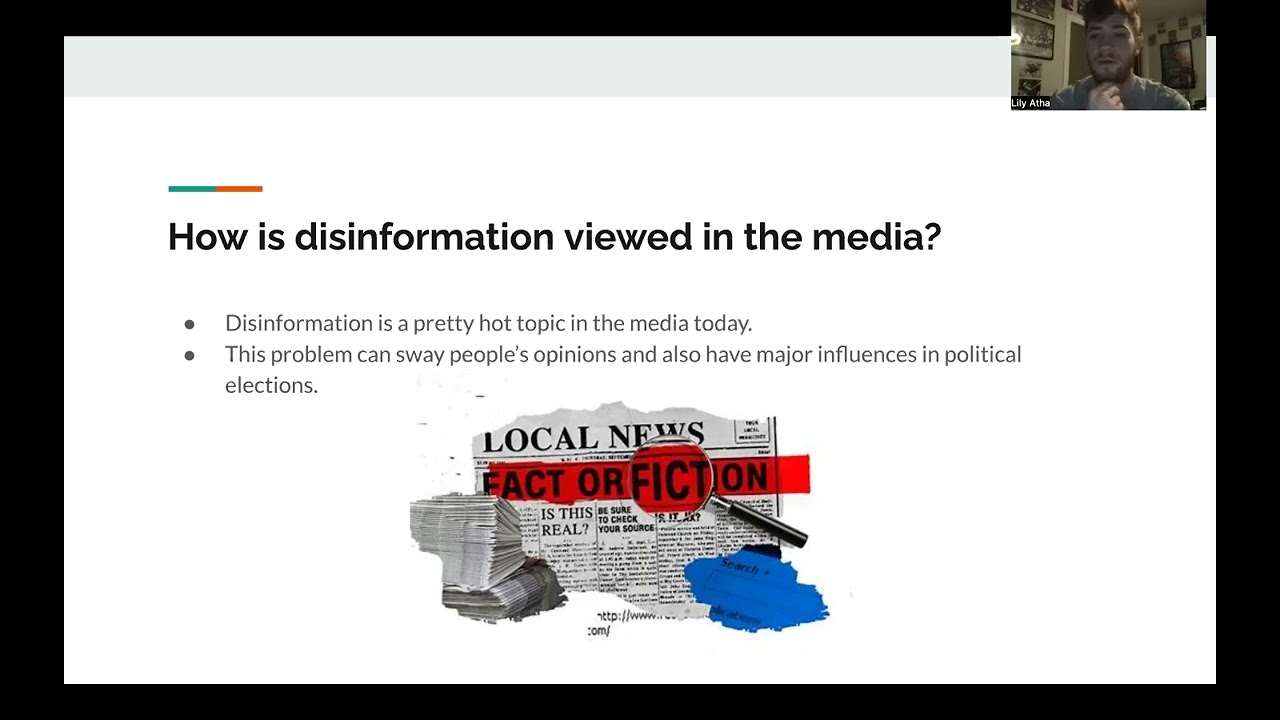Cam Haffner Disinformation Presentation
Unleash Your Creative Genius with MuseMind: Your AI-Powered Content Creation Copilot. Try now! 🚀
Disinformation, the deliberate spread of false information to influence public opinion, has become a pervasive issue in our society. Whether we realize it or not, we encounter disinformation every day through social media and the internet. It is crucial to understand the impact of disinformation, its history, and the organizations working to combat it. In this essay, we will explore the importance of addressing disinformation, its effects on various individuals and communities, and the steps we can take to fight against it.
The Importance of Addressing DisinformationThe spread of disinformation is not only wrong, but it also affects a significant number of people. In a world where false information can shape public opinion and obscure the truth, it is essential for individuals to be educated and discerning. By being well-informed, we can avoid being misled in current events and global issues. Disinformation undermines the foundation of trust and truth that society relies upon. Therefore, it is our responsibility to spread the truth and combat the proliferation of lies.
The Impact on Individuals and CommunitiesDisinformation impacts everyone, but some individuals are more vulnerable than others. Social media platforms like Instagram, TikTok, and Twitter, as well as television news, play a significant role in the spread of disinformation. Those who are less educated or have limited access to accurate information are particularly susceptible to being targeted by disinformation campaigns. Communities that are already marginalized or disenfranchised may also fall victim to the manipulation of disinformation. It is crucial to recognize the impact on these vulnerable groups and work towards empowering them with accurate information.
Disinformation in the MediaDisinformation has become an odd topic in today's media landscape. It has the power to sway people's opinions, especially when influential figures in politics and elections use it as a tactic. The dissemination of false information can be detrimental to the democratic process. It is important for media outlets to prioritize fact-checking and provide credible sources to counteract the spread of disinformation.
Organizations Combating DisinformationThankfully, there are organizations dedicated to combating disinformation and promoting truth. The Media Bias Fact Check (MBFC) and the International Fact-Checking Network (IFCN) are two such organizations. They provide fact-checkers and credible sources to counteract false information. By supporting these organizations and utilizing their resources, we can contribute to the fight against disinformation.
The Challenge of Wikipedia and ExposeWhile Wikipedia is a popular source of information, it is important to exercise caution when relying on it. As an open platform, anyone can contribute to Wikipedia, making it susceptible to inaccuracies and outdated information. On the other hand, platforms like Expose pose a significant challenge as they purposefully publish false stories and information. These platforms, which exist solely to spread disinformation, can mislead people who may not be aware of their deceptive nature. It is crucial to be critical of the sources we rely on and verify information from reputable sources.
Taking Action Against DisinformationTo combat disinformation, we must come together and raise awareness about the issue. Education is key in equipping ourselves with knowledge about current events and critical thinking skills. By staying informed and fact-checking information before sharing it, we can contribute to a more truthful and reliable information ecosystem. It is also essential to question the sources of information we encounter on social media platforms and seek out credible news outlets. Together, we can actively fight against disinformation and promote a more informed society.
In conclusion, disinformation is a significant issue that affects us all. By understanding its impact, recognizing the vulnerable communities it targets, and supporting organizations that combat disinformation, we can work towards a more truthful and informed society. Let us take responsibility for spreading truth and question the information we encounter, so that we can navigate through a world of lies with clarity and integrity.
Works Cited: - Media Bias Fact Check (MBFC) - International Fact-Checking Network (IFCN)

Related Recaps
- GTA V Online: CORRIDA BATE-BATE dentro da arena DA NEVE! (FUNIL GIGANTE)
- David Guetta, Bebe Rexha - I'm good (Blue) (LYRICS)
- Understanding Legal Tools for Investors
- Judge Cannon keeps Trump classified documents trial scheduled for May
- Новости игр! Counter-Strike 2, Atomic Heart, Call of Duty, Star Wars Jedi: Survivor, Resident Evil 4